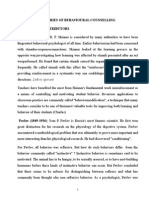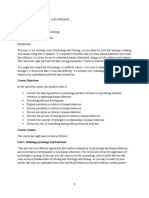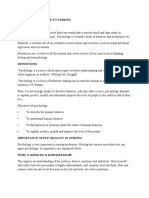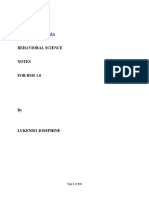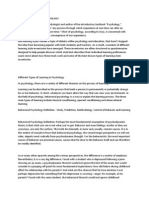0 ratings0% found this document useful (0 votes)
12 viewsActivity 1
Activity 1
Uploaded by
Alysa AbelonThe document discusses behaviorism and how a behaviorist would define ethics based on observable behavior rather than how people ought to behave. It differentiates between animal and human behavior, noting humans have emotions like ego and greed whereas animals do not exhibit such behaviors. Evolutionary psychology argues the brain's functions must be understood in the context of the environment, while behavioral psychology suggests the environment shapes human behavior through reinforcement.
Copyright:
© All Rights Reserved
Available Formats
Download as DOCX, PDF, TXT or read online from Scribd
Activity 1
Activity 1
Uploaded by
Alysa Abelon0 ratings0% found this document useful (0 votes)
12 views1 pageThe document discusses behaviorism and how a behaviorist would define ethics based on observable behavior rather than how people ought to behave. It differentiates between animal and human behavior, noting humans have emotions like ego and greed whereas animals do not exhibit such behaviors. Evolutionary psychology argues the brain's functions must be understood in the context of the environment, while behavioral psychology suggests the environment shapes human behavior through reinforcement.
Original Title
activity 1
Copyright
© © All Rights Reserved
Available Formats
DOCX, PDF, TXT or read online from Scribd
Share this document
Did you find this document useful?
Is this content inappropriate?
The document discusses behaviorism and how a behaviorist would define ethics based on observable behavior rather than how people ought to behave. It differentiates between animal and human behavior, noting humans have emotions like ego and greed whereas animals do not exhibit such behaviors. Evolutionary psychology argues the brain's functions must be understood in the context of the environment, while behavioral psychology suggests the environment shapes human behavior through reinforcement.
Copyright:
© All Rights Reserved
Available Formats
Download as DOCX, PDF, TXT or read online from Scribd
Download as docx, pdf, or txt
0 ratings0% found this document useful (0 votes)
12 views1 pageActivity 1
Activity 1
Uploaded by
Alysa AbelonThe document discusses behaviorism and how a behaviorist would define ethics based on observable behavior rather than how people ought to behave. It differentiates between animal and human behavior, noting humans have emotions like ego and greed whereas animals do not exhibit such behaviors. Evolutionary psychology argues the brain's functions must be understood in the context of the environment, while behavioral psychology suggests the environment shapes human behavior through reinforcement.
Copyright:
© All Rights Reserved
Available Formats
Download as DOCX, PDF, TXT or read online from Scribd
Download as docx, pdf, or txt
You are on page 1of 1
1. What is ‘behavior’?
If you are a behaviorist, how would you define or understand ‘ethics’or
‘morality’? Explain comprehensively.
Behavior is defined as the way a person or thing acts or reacts. If I am a behaviourist, ethics for
me are principles that contributes to a persons behaviour. Instead of focusing on how people
ought to behave, ethics studies why people act as they do.
2. In behaviorist line of thought, are there any fundamental differences between animal and
human behavior? Differentiate the general claims of behavioral and evolutionary psychology.
Give examples of behavioral and evolutionary claims in psychology, particularly those relating to
human action.
There are a lot of differences between animal and human in terms of behaviour. Humans have
many emotions Like ego and greed whereas animals do not have such a type of behaviour.
Evolutionary psychology argues that to properly understand The functions of the brain, One
must understand the properties of the environment in which the involvement of brain happens.
Example is language acquisition. Behavioural psychology suggest that environment shapes
human behaviour. This is the study of observable behaviour. One example is positive
reinforcement. A student gets a small treat if they get high score on a test, in the near future
students work hard and study for their test in order to get the reward again.
3. After reading about behavioral and evolutionary psychology, do you think morality or ethics
exists or are they just either coping and evolutionary mechanisms, or deterministic laws of
nature?
Morality is our ability to separate right from wrong doesn’t really exist.
We determine Right and wrong based off constantly changing emotions an unconscious factors
or what people around us think. We don’t determine right and wrong based off a set of
principles like those found in our environment.
4. Can we control or alter evolutionary traits, thoughts, behavior and actions? How?
No because evolutionary psychology assumes that human behaviour is being shaped within the
environment where the brain evolve.
You might also like
- Psychology Class XI Chapter - 1 Notes CbseDocument11 pagesPsychology Class XI Chapter - 1 Notes CbsePalak Gupta78% (18)
- Unit 11 Assignment 1Document16 pagesUnit 11 Assignment 1suga and spiceNo ratings yet
- Theories of Behavioural Counselling Man 02Document12 pagesTheories of Behavioural Counselling Man 02neha100% (2)
- One Word Splash One Word SplashDocument8 pagesOne Word Splash One Word SplashChristopher ApaniNo ratings yet
- Psychology Teaching Material All Chapters (Shortened FormDocument78 pagesPsychology Teaching Material All Chapters (Shortened Formluel sisayNo ratings yet
- BehaviorDocument5 pagesBehaviornika pavolovaNo ratings yet
- Human Behavior and VictimologyDocument196 pagesHuman Behavior and VictimologyABAN, Princess IvyNo ratings yet
- History and Key Concepts of Behavioral PsychologyDocument4 pagesHistory and Key Concepts of Behavioral PsychologyTobi MM100% (1)
- Lecture Summary On 1st Chapter-2Document4 pagesLecture Summary On 1st Chapter-2siamc1332No ratings yet
- Module 11-WPS OfficeDocument3 pagesModule 11-WPS OfficeRio RamosNo ratings yet
- UT Reading MaterialDocument64 pagesUT Reading MaterialanushkapjpatelNo ratings yet
- What Is BehaviourismDocument6 pagesWhat Is Behaviourismkimmy leeNo ratings yet
- Behaviour CounsellingDocument12 pagesBehaviour CounsellingSharum HussinNo ratings yet
- Verywell Mind: Share Flip Email Search o o o o o o o o o o o o o o o o o o o o oDocument10 pagesVerywell Mind: Share Flip Email Search o o o o o o o o o o o o o o o o o o o o oGirbel CabuyadaoNo ratings yet
- psychology assessment prepared by firomsaDocument8 pagespsychology assessment prepared by firomsabekatmiosNo ratings yet
- Verywell MindDocument8 pagesVerywell MindErNel ALog RoYoNo ratings yet
- Bba 4th Sem Psychology @MBK PDFDocument138 pagesBba 4th Sem Psychology @MBK PDFAastha Sharma75% (4)
- PSYCHOLOGYDocument24 pagesPSYCHOLOGYhimal kafleNo ratings yet
- FrancisDocument21 pagesFrancisTerrence MateoNo ratings yet
- Chapter 1 - ONLY WHAT CAN BE ASKED IN TERM EXAM-2Document7 pagesChapter 1 - ONLY WHAT CAN BE ASKED IN TERM EXAM-2anushkapjpatelNo ratings yet
- Bandura - Social Learning TheoryDocument5 pagesBandura - Social Learning TheoryDenise DianeNo ratings yet
- Introduction To EthicsDocument4 pagesIntroduction To Ethicsoliviadeguzman.beed.passNo ratings yet
- Module 2Document8 pagesModule 2Lester ReyNo ratings yet
- 133705182366245547Document7 pages133705182366245547abdulbasit5582295No ratings yet
- 527291701-Human-Behavior-VictimologyDocument163 pages527291701-Human-Behavior-VictimologyM E D I O S I T ONo ratings yet
- ETHICS Chapter 1 Part 1 NotesDocument2 pagesETHICS Chapter 1 Part 1 NotesApril Joanne IchonNo ratings yet
- Ethics Lesson 1,2,3Document9 pagesEthics Lesson 1,2,3Joanna Jauculan AlbañoNo ratings yet
- ETHICS-Module 1-POSTED IN MOODLEDocument4 pagesETHICS-Module 1-POSTED IN MOODLEAcer CamposNo ratings yet
- PsychologyDocument332 pagesPsychologyየፐፐፐ ነገርNo ratings yet
- X 1 Oep 101 Lecture 1 Q&aDocument12 pagesX 1 Oep 101 Lecture 1 Q&aAbubakar shaban omarNo ratings yet
- WEEK 2 Meaning and Definitions of Psychology Scope of Psychology MethodsDocument11 pagesWEEK 2 Meaning and Definitions of Psychology Scope of Psychology MethodsDr. Shadab Ahamad AnsariNo ratings yet
- Chapte 1 Ethics AssessmentDocument4 pagesChapte 1 Ethics AssessmentSweetzel SenielNo ratings yet
- Elearning Psychology Bupe Milupi V FinalDocument106 pagesElearning Psychology Bupe Milupi V FinalMonde SipaloNo ratings yet
- Unit 2 Approaches to EthicsDocument13 pagesUnit 2 Approaches to EthicsdaviskalamboNo ratings yet
- AnthropologyDocument22 pagesAnthropologyyangi dokaNo ratings yet
- BE Chapter 1Document18 pagesBE Chapter 1damenegasa21No ratings yet
- SOC 107 LECTURE NOTE ONE FOR 20242025Document7 pagesSOC 107 LECTURE NOTE ONE FOR 20242025ganiyuhalimat31No ratings yet
- Unit I Physiological and Biological Psychology ALIBUDBUD CAROLINE T.Document8 pagesUnit I Physiological and Biological Psychology ALIBUDBUD CAROLINE T.jusq marimarNo ratings yet
- CRIM 4 - Professional Conduct and Ethical StandardsDocument27 pagesCRIM 4 - Professional Conduct and Ethical StandardsMar YanNo ratings yet
- MODULE 4 CognitiveDocument4 pagesMODULE 4 Cognitive20138874 PANKHURI SAWHNEYNo ratings yet
- Understanding Psychology McGraw-HillDocument1 pageUnderstanding Psychology McGraw-HillKeeLia SmithNo ratings yet
- 2ND BEHAVIOR OF INDIVIDUALDocument37 pages2ND BEHAVIOR OF INDIVIDUALsa0346799No ratings yet
- Business Ethics Ch1 222Document13 pagesBusiness Ethics Ch1 222Maki Ye EmaNo ratings yet
- Module One ChaPTER ONE - PsychDocument15 pagesModule One ChaPTER ONE - PsychArvella Albay100% (1)
- Psychological Foundation of Education in PakistanDocument10 pagesPsychological Foundation of Education in Pakistansanamehar97No ratings yet
- BBA H.B.percep - emot.MotivaPerson PPT 3Document69 pagesBBA H.B.percep - emot.MotivaPerson PPT 3batoolzehra.matric2004No ratings yet
- Module II - Learning TheoriesDocument9 pagesModule II - Learning TheoriesMeenakshiNo ratings yet
- Understanding PsychologyDocument21 pagesUnderstanding PsychologySagun lohalaNo ratings yet
- Gendso Lesson 1Document5 pagesGendso Lesson 1Sophia PalaciosNo ratings yet
- PNM 121Document97 pagesPNM 121gideon7900No ratings yet
- 17-9-20 History of PsychologyDocument60 pages17-9-20 History of PsychologygeetaNo ratings yet
- Behavior Full NotesDocument141 pagesBehavior Full NotesemilytumwebazemporaNo ratings yet
- Industrial Psychology NotesDocument13 pagesIndustrial Psychology Notesraghu charkhaNo ratings yet
- What Is Learning in PsychologyDocument7 pagesWhat Is Learning in PsychologyOwolabi PetersNo ratings yet
- General PsychoDocument179 pagesGeneral Psychomj6857322No ratings yet
- Chapter VDocument18 pagesChapter VJake SagadNo ratings yet
- BPSY50 LESSON 4 Goals of PsychologyDocument2 pagesBPSY50 LESSON 4 Goals of PsychologyAaron MontalesNo ratings yet
- Essay On Educational PsychologyDocument20 pagesEssay On Educational PsychologyMhameed MuhammadNo ratings yet
- Unit 1Document25 pagesUnit 1samjhana neupaneNo ratings yet
- FeedbackDocument1 pageFeedbackAlysa AbelonNo ratings yet
- Reflection PaperDocument1 pageReflection PaperAlysa AbelonNo ratings yet
- Literary WritingDocument2 pagesLiterary WritingAlysa AbelonNo ratings yet
- Noli Me Tangere SummaryDocument2 pagesNoli Me Tangere SummaryAlysa AbelonNo ratings yet
- Summary and Analysis of Plato's EuthyphroDocument1 pageSummary and Analysis of Plato's EuthyphroAlysa AbelonNo ratings yet


